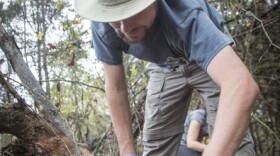In February of 2016, the U.S. struck a deal with the Cuban government to resume scheduled flights between the two countries. Now, for the first time in Missouri State University's history, a group of students took a winter intercession course in the long banned island.
I'm Nicki Donnelson and today my guests are Dr. Alexander Wait, professor of biology at Missouri State, and Ericka Fetner, microbiology student. They are here to share about the experience of visiting Cuba in the course, The History, Culture and Ecology of Cuba: Past, Present and Future.
Alexander Wait:"There's 12 different types of visas that they offer. This was a people to people visa, which meant that we were with a Cuban tour director who's trained by the and works for the Cuban government. Then we were with a EF Tours director.
"We sampled a lot of food. Food was just amazing. We saw a lot of art. Art is a really big part of the culture. We saw a lot of the history, everything from the Russian Embassy, the U.S. Embassy, to churches that date back to the 1400s. They've really well preserved their history, and they embrace their history.
"Our view of Cuba is from what we read because we haven't been able to experience it as U.S. citizens. We also wanted to go for the biology since I'm a biology professor."
Nicki Donnelson:Wait explains what he hoped his students would gather from this trip.
Alexander Wait:"I had my students look at what's called the IUCN Red List for species that designates those species from being not endangered, to different levels of endangerment, to species that are extinct. The scientific community hasn't had a lot of opportunities to explore Cuba, but Cuba has a very diverse group of animals and plants, not really a high amount of diversity, but a lot of unique diversity. For example, there's one scicad that's the only member of the species in the entire family and we did get to see that.
"We didn't get to explore ... Since we were on a people to people visa, we didn't get as much sort of free time in the mountains or in the rainforest, or the coast, but we did get to the coast and the reefs are very well preserved. Sort of an interesting anecdotal story. Fidel Castro, they showed pictures of him snorkeling, and he was very fond of snorkeling. There's sort of two reasons why the reefs are so well preserved. One is because there's not the development of like a Miami or a Cancun. The other is that Fidel Castro really prized those reefs and protected them."
Nicki Donnelson:Though Fetner is a biology student, she points out that her personal goals were different. She was most interested in learning more about the medical field in Cuba, and the experience certainly opened her eyes to her own misconceptions.
Ericka Fetner:"There were students who were just going to learn more about speaking Spanish, and students who were going more to just learn about the culture. All of us were so interested in Cuba for all these different reasons because Cuba is relatively untouched for so many years. It's a really good place to almost go back in time and compare how something in that sphere is worked.
"Whenever I first planned out my curriculum, I just assumed that Cuba would have a poor healthcare system and poor ... Just because of biases, you don't really talk about Cuba except in negative ways. I was really surprised to learn that they are excelling in medicine. They're doing extremely well."
Nicki Donnelson:Due to visa restrictions during the nine day trip, Fetner says she had to adjust her goals.
Ericka Fetner:"My agenda was to try and get into a couple of hospitals there and talk to some medical health professionals. Because we were on a people to people visa, we were very regimented, so I didn't really get a chance to do that. But I talked to a lot of the locals and so it kind of shifted from less their medical practice to more their healthcare system and how the locals felt about their healthcare system and how it had changed since Fidel Castro had taken power."
Nicki Donnelson:Traveling to Cuba for this trip, they reflected up many of the unique aspects of the culture, including the cars and architecture.
Alexander Wait:"For a car aficionado, it is an amazing place. They have American cars that are very well preserved. They also have Russian cars. All of their buses are Chinese because their market's for that. They don't have the U.S. market."
Ericka Fetner:"They had this 200-year old governmental building and they were building a modern glass and shiny black extension on the top, renovating it as a hotel. You could see little renovations like that all over the place, where they were taking these things that were hundreds and hundreds of years old and kind of cannibalizing them to modernize them."
Nicki Donnelson:That was Dr. Alexander Wait, professor of biology at Missouri State, and Ericka Fetner, microbiology student. I'm Nicki Donnelson for the Missouri State Journal.






